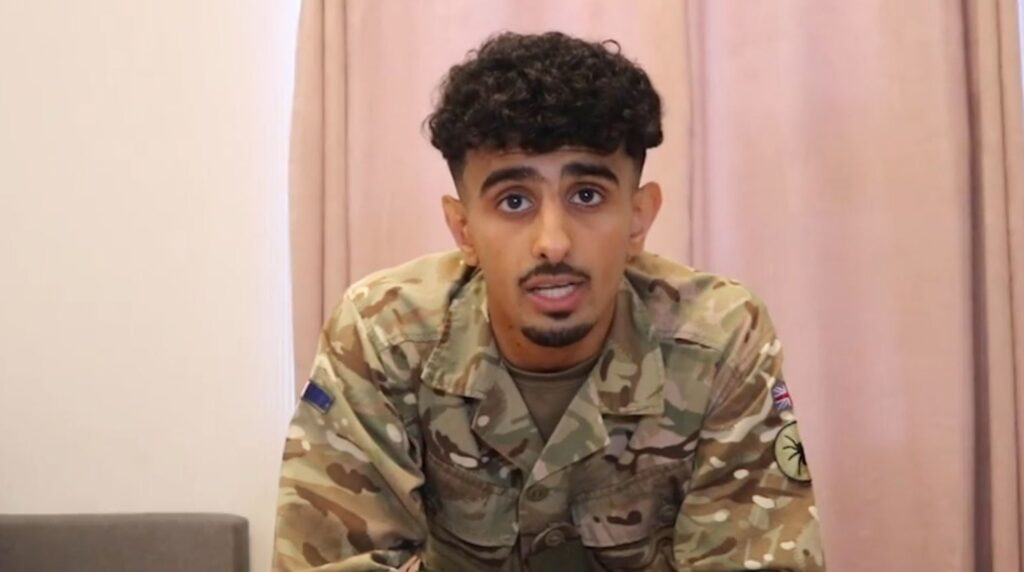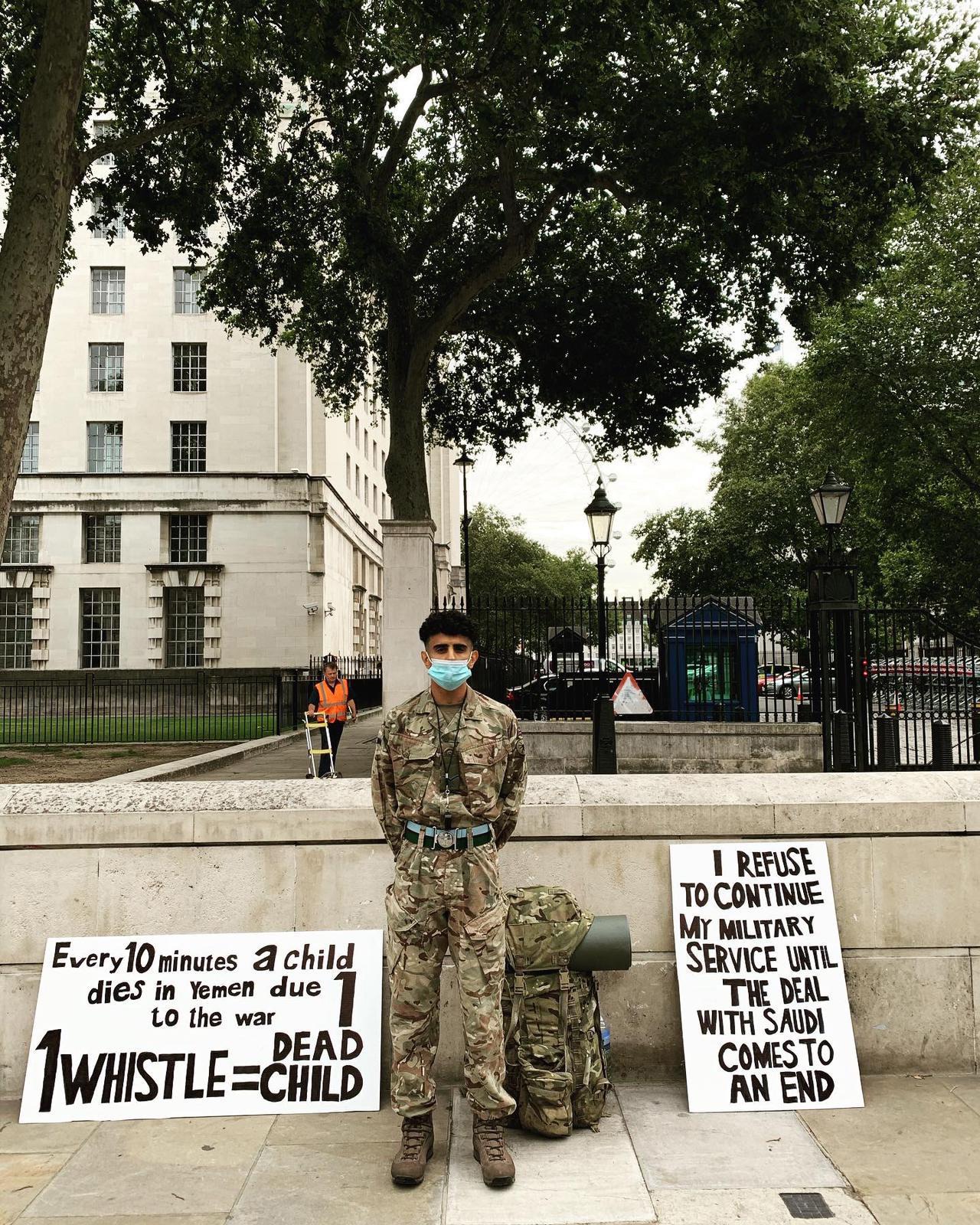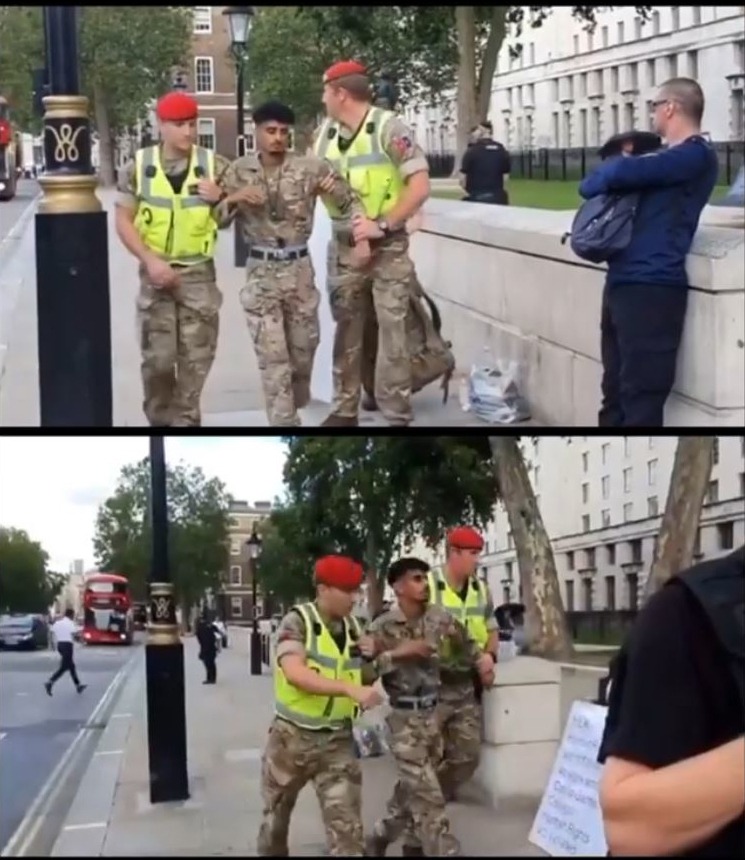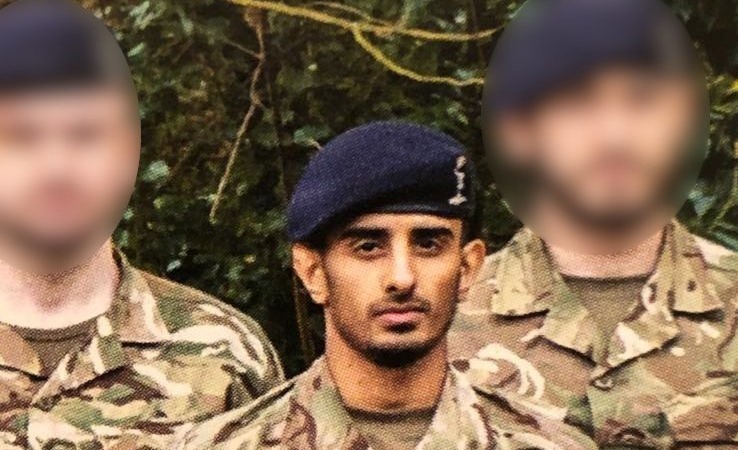The long lockdown earlier this year and sudden shift to working from home gave millions of people the chance to reflect on their jobs and life, many for the first time. In March, even members of the British military were told to start working remotely.
For one young soldier, the effects were profound. Lance Corporal Ahmed Al-Batati, 22, loved his job as a communications engineer and fitness instructor in the army but found that spending more time at home in Sheffield and away from his barracks in Salisbury gave him time to reflect.
There was one issue, in particular, that kept clouding his mind: the devastating war in Yemen, the country where he was born before migrating to the UK.
In July, as lockdown in the UK eased, and with Al-Batati fresh from months reading up on the conflict, a wave of young British Yemenis took to the streets in cities across the UK. They were demanding an end to the Yemen war, which has been raging since 2015 and had created the world’s worst humanitarian disaster.
They had one central demand: stop British arms exports to the Saudi Arabian regime which was leading the brutal air war in the country.

“During this covid time I did research while working from home,” Al-Batati tells Declassified. Then, he adds, “we went out for protests in Liverpool and Manchester.”
At the time, Al-Batati was on attachment to army intelligence from his regular role in the Royal Signals Corps, but, dressed in civilian clothes, he stood among the crowds as they chanted: “Yemen can’t wait.”
Exposed to the movement and the devastating impacts of the war, Al-Batati was determined to do as much as he could to help. He even helped set up a charity to donate food to Yemen.
Millions of children are on the brink of famine in Yemen, but people there told Al-Batati that handouts from the diaspora were not enough. “They were saying you need to stand up to fight against this war, to stop this war. That hit me.”
Despite energetic protests in Liverpool, Manchester, Birmingham, London and Glasgow, the war in Yemen ground on, with critical UK support. Then, on 7th July, the British government lifted an embargo on licensing new arms exports to Saudi Arabia for use in the conflict.
Just days later, children were killed in a remote Yemeni village as a missile made by US company Lockheed Martin ploughed into their house.

“We went out for protests, we emailed our MPs, thousands of Brits emailed their MPs and went out to protest, but it was like nothing happened,” Al-Batati says. “I felt a duty to speak out for those that couldn’t speak, and for those that didn’t have any sort of power in Yemen – even the civilians within Britain, the British Yemenis, feel like they are not heard by their local MPs.”
He decided he would have to try something new. “[It] got me thinking, what can I do to be heard? Quite a powerful thing was the fact that I was in the army and I was Yemeni as well. So that’s when I came up with the idea of protesting outside 10 Downing Street.”
Taking a stand
For Al-Batati, his journey from a communications engineer in the Royal Signals Corp to street protester was wholly unexpected. “I went into the army quite young,” he explains. “I never got into politics, I never looked at the news. I knew that Britain and Saudi Arabia are allies, but I never really looked into what they did, the arms trade that they had, or their connection with Yemen’s proxy war.
“I began to learn that Saudi Arabia was breaking international law, hurting civilians, blocking aid from going into Yemen. No matter who you are fighting, that does not give you an excuse to play with innocent lives, so for me when I learnt about that I was quite outraged by what the Saudis did.”
Britain’s largest arms company, BAE Systems, has sold £15-billion worth of arms and services to Saudi Arabia since the war began. Much of this equipment is for the Saudi air force, which uses BAE-made Typhoon and Tornado jets to launch airstrikes on Yemen. In August 2018, a Saudi airstrike blew up a school bus in north Yemen, killing 40 boys aged from six to 11 who were being taken on a trip.
Last year, the Royal Air Force (RAF) diverted thousands of Tornado spare parts to the Saudi fleet, which requires constant maintenance to keep airborne. Throughout lockdown, BAE sent a cargo flight every fortnight from its fighter jet factory in Warton, north-west England, to Ta’if airbase in Saudi Arabia.
This week it emerged that some Royal Navy liaison officers are working in the Saudi Armed Forces headquarters where their role includes helping to decide which cargo ships are allowed to deliver aid to Yemen.
The growing evidence of Britain’s multi-faceted role in the conflict troubled Al-Batati. “I researched that Britain was arming Saudi Arabia and actually training Saudi troops in strategy and tactics on how to approach the Yemen war.”
He pauses. “I actually only found out from Declassified UK that there was the RAF working along with the Saudi troops.”
This year, Declassified found from a freedom of information request that the RAF had given Saudi air force technicians a bespoke training course on Tornado maintenance at RAF Cosford in England. RAF instructors on secondment to BAE Systems also provide training support to Saudi Tornado aircrew.
“I was quite outraged and upset by it because I came from that country, I came from Yemen. I was born in Yemen, and I migrated to this country. Even though I was protecting and serving this country, Britain, they were also arming Saudi Arabia to bomb my homeland. That’s what made me go into doing my protest, even though I loved my job.”
Al-Batati could not tolerate the contradictions. “I didn’t feel comfortable staying serving a corrupt government and continuing living the life when in the back of my mind I know my people are suffering because of the same government that I serve.”
Charity wasn’t enough any longer, he adds. “Maybe I’m supporting these people by donating aid and helping to raise money but at the same time I’m serving the same government that is arming Saudi Arabia to bomb them and to block aid from coming in. So I felt like a hypocrite in a way.”
On a bank holiday Monday in August, Al-Batati decided it was time to act. Wearing a full army uniform, he stood outside 10 Downing Street and blew a whistle every ten minutes to indicate that a child was dying every ten minutes in Yemen. “For me, it was a kind of a strike. To say: ‘I’m serving you but you are not hearing my opinion on political views of the Yemen proxy war’. I wanted them to hear.”

“I know a lot of politicians did hear,” he adds. “It got mentioned in parliament as well, so for me, that was a success. Even if it didn’t happen, if it didn’t go viral and only reached 10 or 20 people, it’s the fact that I tried.”
Al-Batati says his Muslim faith made him feel compelled to speak out. “As a man of principle and a man of religion, I will be asked one day by something greater — a greater power — what did I do? And at least I can say I tried and I stood against injustice which is something that is taught in my religion.”
Arrest
Al-Batati is not the first soldier to publicly criticise British foreign policy, but he is one of the youngest. In 2006, SAS trooper Ben Griffin, then 28, quit the army after three months in Baghdad, describing the military intervention in Iraq as a “war of aggression” and “morally wrong”.
Griffin expected to face a court martial but instead, he was discharged with a glowing testimonial. Other soldiers have been treated differently.
In 2009, Joe Glenton, then 27, was arrested for refusing to return to Afghanistan on moral grounds and jailed for nine months for being absent without leave (AWOL). His court case focused media attention on the ethics of Britain’s war in Afghanistan.
Al-Batati had no idea what the military’s reaction would be. “I didn’t know what would happen, I didn’t do any research on the history of this,” he says. “I only found out about Joe Glenton after I did the protest and after I was arrested. I was expecting to definitely get arrested but I didn’t know how I would be treated or what the outcome would be.” “But,” he adds, “I was expecting the worst.”
As Al-Batati prepared for his own protest, he set up an Instagram account called Stand For Justice and posted a video online. “I would rather sleep peacefully in a cell than continue to stay silent for a paycheque,” he said into the camera.
And within hours of setting up his protest site in Whitehall, two members of the Royal Military Police arrested him and led him away to a station.

He was searched, fingerprinted and photographed, but never handcuffed. “I wasn’t mistreated in any way. I wasn’t put in a cell, I was put in a room. They bought me food, they let me pray and a lot of them were quite friendly. I wasn’t charged with offences that were justified with being imprisoned.”
He adds: “I broke two military laws — disobeying a lawful order and protesting whilst in uniform. I wasn’t charged with going AWOL which is an imprisonable offence. They arrested me within 48 hours so they couldn’t charge me with going AWOL.”
Meanwhile, the Ministry of Defence (MOD) went into damage limitation mode. Its press office refused to give Declassified any comment on Al-Batati’s arrest. One spokesman, Lieutenant Colonel Wade, said “we no longer deal with your publication.”
An official review later found out that Wade was under the impression from the MOD’s head of communications, Carl Newns, that press officers “should not waste any time” on Declassified, after one unnamed military officer designated our critical reporting of British foreign policy as “hostile”.
The Defence Secretary, Ben Wallace, who ordered a review into Declassified’s blacklisting, told Parliament this week it was “not appropriate” to disclose which military unit this officer belongs to. Newns has since been moved to a different government department.
Al-Batati now reveals more about the atmosphere inside the military following his protest. “It did come by surprise. I don’t think they were expecting anything like that, especially from my unit.”
He was highly-rated within the institution. “I don’t think that they thought – in their words, an ‘exceptional soldier’, who always followed orders and did what was told of him – would suddenly disobey a lawful order and go on protest outside 10 Downing Street.”
They were caught off-guard. “They didn’t know what to do in the early stages of it, and that’s why it took so long,” he says. “This was my first disciplinary action. Their first approach was, did I need disciplinary action? The officers turned around and said, ‘clearly he doesn’t need disciplinary action, there’s nothing to discipline, it’s his opinion.’”
Support
In February, the British army quietly deployed members of the Royal Artillery Regiment to the Saudi capital, Riyadh, armed with Giraffe air-defence radars. Their mission, which has so far cost £840 360, is to protect Saudi oil fields from drone attacks – a weapon favoured by Yemen’s Houthi rebels who have no fighter planes of their own.
The deployment did not emerge until October when it was buried inside the MOD’s annual report. Since then, defence minister James Heappey has refused to tell parliament how many British soldiers are involved in the deployment, citing “operational and personal security reasons”.
Another reason for secrecy might be that many in the British army could question such a role. “Within the military, quite a lot of people sympathised with what I did and they agreed with my opinion of the arms trade with Saudi Arabia,” Al-Batati says.
“They didn’t agree with the British foreign policy in arming Saudi Arabia, although there were a lot of people that misunderstood it as if I was rebelling against the military.”
His unit didn’t view him as a traitor, either. “My unit is quite supportive of their soldiers and when I explained to them the reasons for my protest and my intentions a lot of them did agree with what I did. But obviously, they had orders that I’d broken military law and I couldn’t just be let off.”
At first, he was kept confined to camp, before being allowed to go home. He returned four or five times to sign paperwork and receive updates on his case. “There was a lot of waiting around and seeing what to do,” he says. “I heard there were disputes. A lot of people were pushing, especially my unit, that I leave the army. I think there were some that disagreed with that and felt that I needed disciplinary action, so it was just back and forth for quite a long time.”
Meanwhile, Al-Batati received support from Veterans for Peace, an anti-war group whose members, which have included Griffin and Glenton, have extensive experience of the military justice system.
“Veterans for Peace was in full and continuous support throughout all of this,” Al-Batati says. “A couple of members kept on checking up on me and messaging me. They went out to protest in the same place that I did.”
In December, after three months in limbo, Al-Batati was finally allowed to leave the army without any disciplinary action being taken against him. “I don’t know if it was done out of being reasonable with me or whether they didn’t want any more media coverage and for it to escalate even further than it already did.”
Growing list of whistleblowers
When Al-Batati joined the army, aged 19, he was told he had “a lot of potential” and passed basic training with flying colours. “It was one of the best times of my career, it was great, I loved it. They had plans for me, a full career, and I was a prospect.”
Back home in Sheffield, he is now readjusting to civilian life. “It’s a setback in a way, but it’s a setback that’s worth it and I’m willing to take for my beliefs.” His activism won’t stop, either. “I’ll definitely be continuing the Stand for Justice movement with future projects against injustice. That for me will make me happier than me thinking about a bigger paycheque.”
Since Al-Batati’s protest, another insider has broken ranks over British arms sales to the Saudi regime. Molly Mulready was a Foreign Office lawyer who had helped the government defend its arms trade at the High Court in London. In October, she told the Independent: “I have acute shame about my role in all of this. I did not become a lawyer in order to justify the moral depravity that is the export of arms to Saudi Arabia.”
Mulready and Al-Batati join a long list of Yemen war whistleblowers.
Britain’s former defence attaché to Saudi Arabia and Yemen, Brigadier John Deverell, has told Declassified that the decision to resume arms sales was “an absolute shocker” which he compared to “the efforts made by Wilberforce and the Quakers to get slavery abolished being obstructed by the economic arguments. Money is uppermost in the minds of the decision-makers. This is neither right nor sustainable.”
Yahya Assiri, a former Saudi air force officer, has told Declassified: “There’s no support inside [Saudi Arabia] for these violations – even the royal family is now divided on the issue. And by training these Saudi pilots, and enhancing their capacity to attack Yemeni civilians, the UK is participating in war crimes and contributing to the world’s worst humanitarian crisis.”
Al-Batati continues to raise money to send humanitarian aid to Yemen while he considers his future. “Yemeni civilians are not just being killed by bombs but being starved, deprived of food and water,” he says. “If it was a group of rebels that did it, it would be called terrorism. Why is it, when it’s a country doing it, it’s not labelled as terrorism?”
He adds: “It’s a total crime to aid and abet a country that is killing civilians just to take out a couple of rebels. It’s money over human life at the end of the day.
“I didn’t expect to end the arms trade and I don’t think it will end any time soon, but that won’t stop me from trying to fight it,” he says as we finish. “I know I’ll be questioned. Did you go out there and try to fight it? You can be sitting at home, saying it’s a lost cause, but did you try? Is the reason why it’s a lost cause because of the people not speaking out?”
An Army spokesperson said: “Service personnel are entitled to participate in peaceful demonstrations as private citizens. However, this must be done in their own time, in civilian clothing, and in a manner that does not bring the Army into disrepute.”
A Government spokesperson claimed: “The Government takes its export responsibilities seriously and assesses all export licences in accordance with strict licensing criteria. We will not issue any export licences where to do so would be inconsistent with these criteria.”


